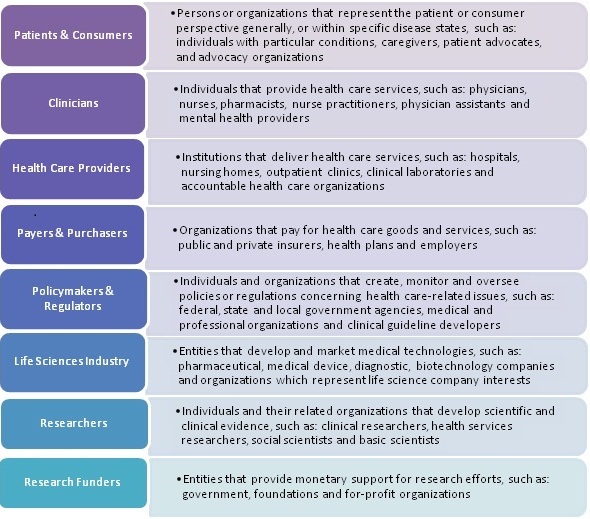Center for Advancing Stakeholder Engagement
Stakeholder engagement is an iterative process of actively soliciting the knowledge, experience, judgment, and values of individuals who have been selected to represent a broad range of direct interests in a particular issue.1 Comparative effectiveness research engages patients, clinicians, policymakers and other stakeholders throughout the research process for input on gaps in evidence; priorities for research; important treatment comparators; and outcomes relevant to healthcare decision making. Stakeholders are brought together to create a shared understanding of the issue in order to make relevant, transparent, and effective decisions. Through stakeholder engagement, researchers are able to develop evidence that is better aligned and informative for real world decision-making, fostering the translation of evidence into clinical practice.1,2
CMTP is widely recognized for its expertise in methods for eliciting stakeholder input in a meaningful way to support specific project goals. While stakeholder engagement is a core element in all of CMTP projects and initiatives, the development of effective processes and methods for involving stakeholders in all aspects of CER is situated in the Center for Advancing Stakeholder Engagement (CASE). CASE has a broad range of expertise supporting, facilitating and evaluating stakeholder engagement activities to ensure successful and meaningful collaborations.
The figure below provides descriptions of key stakeholder groups for CER and is part of CASE’s conceptual framework for stakeholder engagement in CER.1 Please visit our staff publications page for more information about CMTP publications on stakeholder engagement.
- Deverka PA, Lavallee DM, Desai PJ, et al. Stakeholder Participation in Comparative Effectiveness Research: Defining a Framework for Effective Engagement. Journal of Comparative Effective Research.In Press.
- Hoffman A, Montgomery R, Aubry W, Tunis SR. How Best To Engage Patients, Doctors, And Other Stakeholders In Designing Comparative Effectiveness Studies. Health Affairs. October 1, 2010 2010;29(10):1834-1841.

